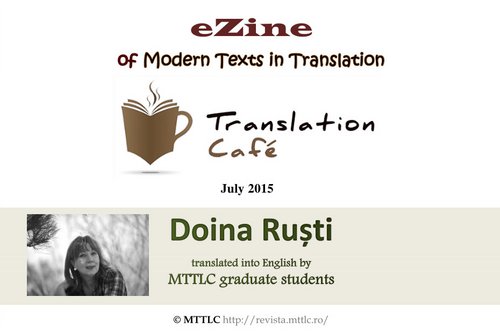
Bianca Zbarcea: Your most recent novel, The Phanariot Manuscript, touches on a theme with deep historical roots, especially Romanian. What made you choose this theme?
Doina Ruști: An old passion of mine for the 18th century.
BZ: What is the premise of the book?
DR: In the year 1790, the sultan Selim III wrote a song about a city of all pleasures, named Bucharest. People from all around the Ottoman Empire started searching for this land, amongst them a 17 year old teenager, Leun. Once he arrived in Bucharest, he was amazed to discover a world of perfumes and bliss, with rustling clothes and white houses, with fiddlers, beautiful women, but also slaves. In this joyful city (as the name informs us) freedom is an always-changing concept, just as the capricious weather of this land. That is the storyline of the novel.
BZ: What was the source of inspiration for your novel?
DR: It all started from a "nizam", an order given by prince Alexandru Moruzi, who wanted a fugitive valet found. It was from the year 1794. This document whetted my appetite, especially considering the fact that he wasn’t being blamed for anything. All he had done was leave in the middle of the night, without stealing anything, taking with him nothing but his green clothes, which had been carefully described in many police documents. Of course, I started asking myself lots of questions: if he hadn’t killed anyone and hadn’t stolen anything, why did they look for him so unremittingly? For a few years after, I searched for documents that mentioned Leun, an adolescent valet, most probably French, judging by the name and his Western clothes. And then one day I stumbled upon something much more interesting, a short manuscript which registered in the most prosaic way the tormented life of a young man. And his story was subtly connected to the flight of the valet Leun. That inspired my novel.
BZ: So the main theme of the novel is travelling?
DR: Oh, no! It’s a romance, a story about two teenagers who love each other and share a love-and-death bond. I won’t say anything else on the subject!
BZ: As it is a historical novel, I would like you to talk a bit about the period presented in the book. How would you describe the Phanariot Age?
DR: First of all, it must be mentioned that the action of the novel is placed in the Age of Enlightenment – that century of aerostats, mechanical toys, first experiments concerning electricity. It’s the age of Frankenstein and the French Encyclopaedia. And the Romanian Lands were no exception. What we now call the Phanariot Age lasted from 1714 to 1821.
The plot of my novel is set in the last years of the century. In the 1790s a hiatus appears in the Phanariot line. Bucharest was under Austrian occupation, “the Germans with tails”; the soldiers from the Russian army, their ally, were spending all their time in bars, and the Ottoman Empire was not eager to send troops to a land that paid its protection racket scrupulously and always on time. So that is how the parties started: the first piano is brought to Bucharest during that time and also the Viennese goods, especially sweets and clothes.
One year later, the Turks came into town, throning once more a Phanariot prince, a Greek who was loyal to the sultan. From that moment on, the princes from Phanar succeeded one another constantly, bringing with them Istanbul’s fashion, Greek books and most importantly, the ideals of freedom from the Turks. But the Romanian 18th century is much more than that.
BZ: You once told me that you never start writing a new book without having in mind its plan. Have you already thought of a new novel or project that might come to life in the near future? Could you reveal to us, exclusively, any ideas that you might consider using in the new book?
DR: It’s true, Bianca, I never start writing until I’ve established in my mind all the details of the story. I haven’t yet reached that stage though. For now, I’m simply dreaming, without making plans.
BZ: What is the nicest thing a reader has ever told you?
DR: My readers are generous people; they’ve told me many nice things along the years! Amongst them, I recall an episode about the novel The Little Red Man, where a phone number was written, which many people tried calling. I took that as a compliment. Of course, that really was my phone number, but it was a number that I planned on cancelling soon. I didn’t think it would be reassigned to someone else. Or not that fast, anyway, knowing how things worked in Bucharest. However, it did happen. The new owner of my former phone number was an old and very talkative lady. I’ve received many letters on the subject of these conversations. Savoury ones. But the fact that there were people who actually called a number mentioned in a work of fiction was the most amazing and jaw-dropping thing; they believed me and what’s more important – they played along.